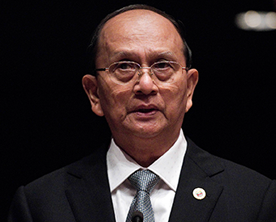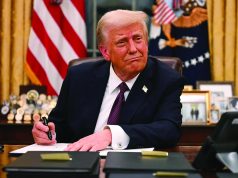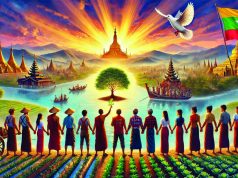When President Thein Sein assumed his position as president, nobody expected the extent of change that would happen under his tenure. There were those who thought no change will happen at all. Now, his legacy as the transition leader is sealed.
His term started with releasing of jailed activists, a human rights move that started the engagement with the rest of the world. He followed it up with the passage of several economic laws that attracted development aid and foreign direct investments. Money flowed to sectors like tourism, telecommunications and constructions and triggered further economic activities throughout the country. The presence of mobile phones even in remote areas of the country was trickle-down effect of the changes that happened. In key cities, physical transformation is evident with the changing skylines brought about by high-rise buildings.
It was also a surprise that the President made decisive actions like halting the Myitsone Dam project. It has enraged longtime ally China, but he stuck with his decision to stop it amidst the protest on its environmental effects.
One of the boldest initiatives is the signing of the national ceasefire agreement. Painstaking peace talks initiated with ethnic armed groups resulted to the signing of an agreement for a national ceasefire. It was limited with several ethnic organizations opting not to sign, but the stage has been set for wider participation in the process of democratization and dialogue for the meaningful participation of ethnic groups in national affairs. What may be considered as the ‘swan song’ was the just concluded elections. It was peaceful and orderly and despite some efforts to thwart the will of the people it was concluded to be fair.
Change indeed happened; it was the legacy of President Thein Sein. We give the credit to whom it is due. The question now is, what can we expect from the new administration?
Political agenda: Amending the Constitution
The National League for Democracy (NLD) campaigned with the platform of change. Earlier, it was depicted as an elitist party who insisted on its chosen candidates and failed to take-in activists from the 88 Generation group and ethnic parties. The election was the chance of a lifetime for the opposition to gain control of the government. Taking in activists and ethnic candidates would mean dealing with parochial issues specific to each ethnic group. It would also mean process of long-winded consultations and negotiations which will sap the energy of the party and divert it from its main objective. With a disciplined membership, NLD ensures it will speak with one voice and act in one direction.
There were two main themes during the campaign – structural changes and reconciliation. Changing the constitution to rectify inherent defects is expected to bring about meaningful and sustainable transformation. Without breaking the vestiges of military control, it would still be the old guards who will run the show. The full energy of the party will be on this basic political issue of constitutional change.
This position however is very tricky because of the resistance from those who will be greatly affected. Popular opinion will also count in the effort to change the constitution. Setting up the body that will initiate the change will be a main issue. A constitutional convention may be formed, or the Pyidaungsu Hluttaw can be a constituent assembly that will tackle the proposed changes. After the body is established, the substantial issues to be discussed will elicit discussions that may divide the country into factions. We can expect every step of the way will be met with hindrances from those who would like to maintain the status quo. Reconciliation with other powers in the country is the second theme of the new administration. This effort may easier to do, if we are to consider the actions of key personalities representing power blocks in the country. Most of the defeated USDP candidates, who were former generals, conceded early during the elections. Tatmadaw Commander-in-chief General Min Aung Hlaing also stated willingness to work with Daw Aung San Suu Kyi. This was met with skepticism from those who cannot believe that the military will immediately surrender their power. It remains to be seen next year if the military will relinquish power. However, the constitutional change initiative may spoil the reconciliation initiative as the issues will be divisive. Will the political landscape change with the new administration?
Sidelining Economic Agenda There were high expectations whoever will be the next government for the economic momentum to be sustained. For the investors, the untapped potentials of the country can be attained by promising a period industrial peace. For most of the people, the benefits of democracy must be felt by the poorest sectors of the society and should not be consolidated in the hands of the few. A wide range of business policies have to be enacted into laws to make the economy more aligned with the rest of the world. The fear is that efforts at sustaining the momentum of economic changes made in the past years may be sidelined by the political agenda of the new administration.
Interest groups would protect projects implemented through influence like the suspended Myitsone Dam. Efforts at regulating extractive industries that have been in the grips of power elites, some sector in the military and ethnic groups will be met with strong, if not violent resistance. Some tycoons bet on both sides by saying public they have contributed to NLD. If their interest will be affected, there is a possibility they will start supporting destabilization acts to derail the economic agenda of the government.
Focusing energies to constitutional change and pushing economic reforms can be likened to fighting a war in two fronts. The question then is, will economic development be sustained or will it be sidelined?
Retooling a Stagnant Bureaucracy
Limited experience in governance is one issue against the NLD. How can the new administration energize the bureaucracy and retool them to serve their customer – the public. As it is today, government employees can be described as unsmiling, grouchy and slow, looking more at the errors and loopholes instead of facilitating things for the people who are paying taxes to support them. Customer satisfaction and public service remains unheard of in most govern-ment agencies today.
The current mindset is to wait for the instruction from the superior. Initiative is unheard of because errors will mean strong reprimand and even separation from service. The fear of displacement is so strong that most employees will do nothing and wait instead of looking out for solution. Now the fear is whether to support the new administration or not. Will the opposition remain in power for a long time, or will there be a comeback of the old regime? The new administration obviously would like to move fast and deliver results to respond to the expectations of the people. With an unresponsive bureaucracy, service delivery would remain slow and reflect badly on the new government. Will the new administration inspire the stagnant bureaucracy, and will its learning curve be short? These questions beg for answers.










